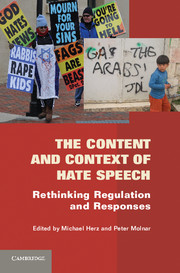Book contents
- Frontmatter
- Contents
- Contributors
- Foreword: Hate Speech and the Coming Death of the International Standard before It Was Born (Complaints of a Watchdog)
- Foreword: Hate Speech and Common Sense
- Acknowledgments
- Introduction
- Part I Overviews
- Part II Refinements and Distinctions
- 7 Social Epistemology, Holocaust Denial, and the Post-Millian Calculus
- 8 Denying Experience
- 9 What's Wrong with Defamation of Religion?
- 10 Responding to “Hate Speech” with Art, Education, and the Imminent Danger Test
- 11 Reconceptualizing Counterspeech in Hate Speech Policy (with a Focus on Australia)
- 12 Hate Speech and Self-Restraint
- 13 Hate Speech in Constitutional Jurisprudence
- 14 One Step Beyond Hate Speech
- 15 Hate Speech and Comprehensive Forms of Life
- Part III Equality and Fear
- Part IV International Law
- Index
- References
12 - Hate Speech and Self-Restraint
Published online by Cambridge University Press: 05 June 2012
- Frontmatter
- Contents
- Contributors
- Foreword: Hate Speech and the Coming Death of the International Standard before It Was Born (Complaints of a Watchdog)
- Foreword: Hate Speech and Common Sense
- Acknowledgments
- Introduction
- Part I Overviews
- Part II Refinements and Distinctions
- 7 Social Epistemology, Holocaust Denial, and the Post-Millian Calculus
- 8 Denying Experience
- 9 What's Wrong with Defamation of Religion?
- 10 Responding to “Hate Speech” with Art, Education, and the Imminent Danger Test
- 11 Reconceptualizing Counterspeech in Hate Speech Policy (with a Focus on Australia)
- 12 Hate Speech and Self-Restraint
- 13 Hate Speech in Constitutional Jurisprudence
- 14 One Step Beyond Hate Speech
- 15 Hate Speech and Comprehensive Forms of Life
- Part III Equality and Fear
- Part IV International Law
- Index
- References
Summary
It is a truism of comparative constitutional law that the United States takes an absolutist position against the criminalization of hate speech, and that it is alone among the constitutional democracies in taking this position. The First Amendment, as interpreted by the courts, bars states and the federal government from banning hate speech just because it is hate speech and for no other reason. Other constitutional democracies do ban hate speech just as hate speech, and for that reason alone. They may justify the ban differently; they may differ on its extent and consequence. But one way or the other, to one degree or another, they ban hate speech and the United States does not.
The truism recognizes, of course, that the United States, in fact, does ban hate speech. What the United States does not do – and constitutionally cannot do – is ban hate speech as such. However, if hate speech falls within one of the well-known exceptions to protected speech, then the First Amendment does not stop the government from banning it. Possibly relevant exceptions include “fighting words” and words that create a “clear and present danger” of imminent lawlessness. Yet the exceptions are limited. They permit little more than the criminalization of words that are tantamount to an incipient assault, and neither of them permits the naked and unadorned criminalization of hate speech.
- Type
- Chapter
- Information
- The Content and Context of Hate SpeechRethinking Regulation and Responses, pp. 217 - 241Publisher: Cambridge University PressPrint publication year: 2012
References
- 8
- Cited by



